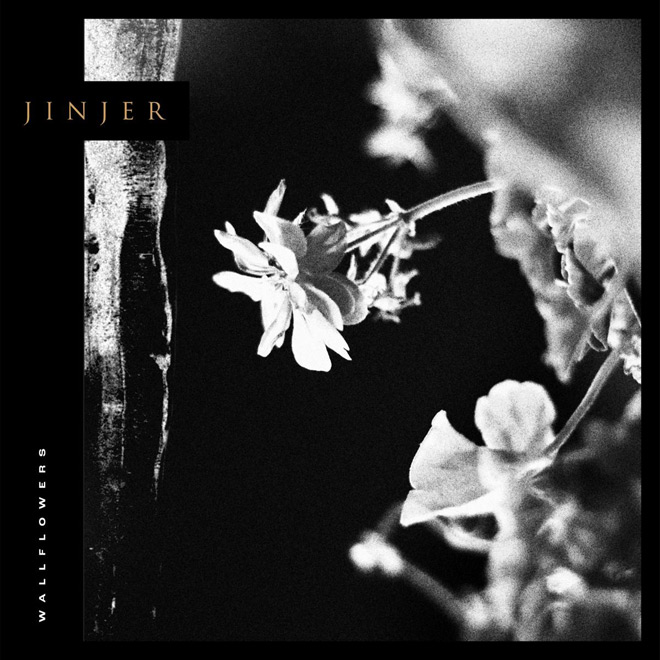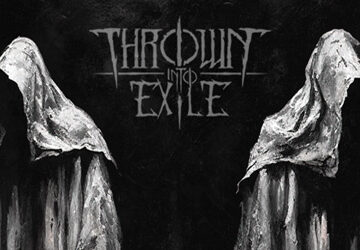
So, yes, they are led by an exceptional frontwoman who is apt to draw comparisons to Arch Enemy powerhouses Angela Gossow and Alissa White-Gluz, but that’s just another point in Jinjer’s favor. And with their fifth full-length, the upcoming Wallflowers—which is slated to arrive on Friday, August 27, 2021 via Napalm Records—Shmayluk and her cohorts set out to smash the steel ceiling, proving that their signature blend of sonic brutality, theatrical guitarwork, and entrancing melancholia is worth your notice.
Through hard work and determination, along with critically acclaimed, chart-topping releases, Jinjer are in a comfortable spot these days. Hailing from the conflict-ridden region of Donetsk, but now calling Kiev their home, their dedication to non-stop touring has brought them around the world. And while no band starts at the top, before their debut full-length, Inhale, Don’t Breathe, was re-released in 2013, they had already begun to make waves in their native Ukraine. With the smoke already rising for the young group, 2014’s Cloud Factory, 2016’s King of Everything, and 2019’s Macro were exactly what was needed to morph a campfire into an inferno.
The support of a loyal international fan base, coupled with Jinjer’s own passion and perseverance, has brought them here: to Wallflowers. The 11-song collection, their fifth full-length studio offering, marks the next step in the quartet’s evolution: a melancholic mélange of insight into their personal adversities brought on by the worldwide events of the past year. Using the flashiest of terminology, one might call Jinjer—Vocalist Shmayluk, Guitarist Roman Ibramkhalilov, Bassist Eugene Abdukhanov, and Drummer Vlad Ulasevich—Progressive Groove Metal, but their unique signature is coupled with poetic lyrics reverberating with emotional savagery.
We see this throughout Wallflowers. Produced with longtime friend Max Morton (Grimfaith, Sunrise), the LP opts to waste not a second as Ibramkhalilov and Abdukhanov launch the group into the mire and mayhem of “Call Me A Symbol.” Here, despite the relentless crush of Shmayluk’s vocal assault, there is that groove, one that is befitting of the journey on which we are about to embark. And what lies ahead is a trip beneath the skin to witness burn out, frustration, and emotional rage, all delivered with technical musicianship that exists thanks to Prog Metal influences that enmesh themselves with ‘90s Alt Rock/Grunge.
In some of the album’s finest moments, Jinjer amalgamates influences that seem to range from Kittie to Mudvayne, bolstering them to grittier levels and creating a wholly modern attack. This occurs on “Vortex,” where Ibramkhalilov’s grungy guitars mirror Shmayluk’s theatrics, as well as on the sludgy lament of “Pearls and Swine.” Alternately, in moments like “Copycat,” they take to the ring with uncensored aggression juxtaposed alongside some fleet-fingered Prog Metal licks.
Shmayluk, while often the focus of the media, is not the only one to earn the spotlight throughout the disc. Ibramkhalilov’s guitar work owns “Dead Hands Feel No Pain,” while he and Abdukhanov draft the dirge of “Sleep of the Righteous.” Together their fluid partnership helps to deliver the urgency of “As I Boil Ice,” before the album reaches its climax with “Mediator.” But here it is Ulasevich’s frenetic blast beats that drive the mayhem and headbanging as the band flawlessly combines melody with their slaughtering side.
If there is one, the drawback to Wallflowers is that, in finding their own signature sound, Jinjer overplay their cards and inadvertently shuck diversity. In simplest terms: much of the album fails to clearly delineate where one track ends and the next begins. For some, that will be a positive feature—one that is all too common among the elite of Prog Metal—though, for other listeners, this may be seen as a drawback. There is, too, an odd disconnect between Shmayluk and her bandmates at times; like two disparate pieces, the vocalist and the musicians seem to part ways before regrouping on the chorus, particularly on “Colossus.”
Often this division somehow works in their favor, and sometimes they do offer surprises. Songs like “Disclosure!” begin as one thing before morphing into another, while the (semi-) titular track, “Wallflower,” slingshots itself into left field. Despite this it still manages to offer an immediate familiarity as Shmayluk’s inner angel takes the microphone for the most accessible offering on the LP. With a smattering of bluesy grit, this particular stand-out provides a glimpse into the depth and range that waits patiently in Jinjer’s future.
There will be backlash, as there always is. For now, however, it’s safe to say that Jinjer has only the most molten of Metal running through their veins as they spit poetica with a groove-laden attitude. And with the obliteration of genre that sits at the core of Wallflowers, they have set themselves up for a chaotically beautiful next chapter. From floating like a feather to crawling through the Stygian muck, they do it all with finesse. For this, Cryptic Rock gives Wallflowers 4 out of 5 stars.






No comment